QO Amsterdam
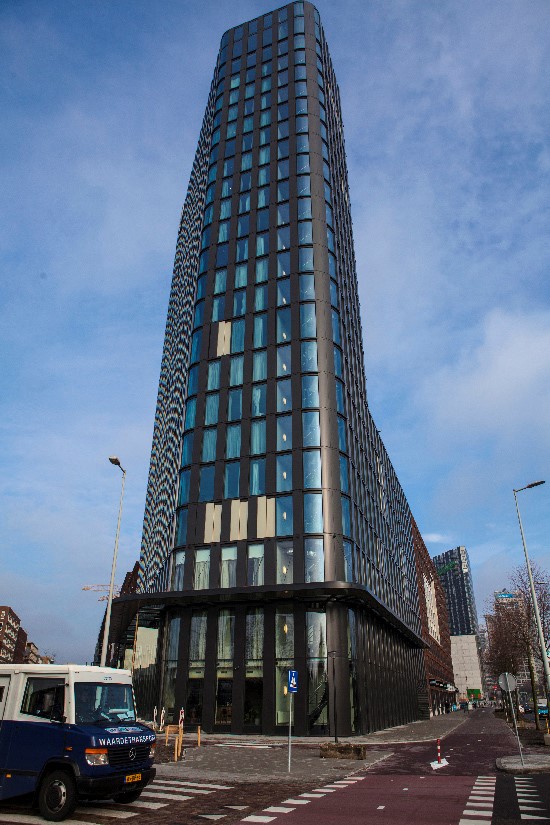 vrijdag 16 november 2018
vrijdag 16 november 2018 MAXIMIZING SUSTAINABILITY

The QO is designed to set new standards in ‘responsible hospitality’, meeting the needs and expectations of travelers without damaging the environment.
The ambition from the outset for the 288-bed hotel was to achieve LEED Platinum, an internationally recognized sustainability standard.
Energy requirements are reduced to the minimum using intelligent climate control which recognizes whether and how many persons are present in a room and adjusts the ventilation, heating and cooling. The hotel exterior is a glass shell made of thermal panels which adapt and react to the climate outside. Sliding aluminum panels create extra insulation on cooler days or let in light to add warmth.
Buried 70m underground is an energy storage system; a thermal aquifer that stores heat from the warmer months, releasing it when needed, to provide hot water for, among other things, the dishwash. A grey water system limits wastewater; water from the showers and sinks is used again to flush the toilets.
A greenhouse on the roof uses integrated aquaponics to grow fish and plants in a mutually beneficial ecosystem. The fish waste provides an organic food source for the plants and the plants purify the water for the fish.
Almost a third of the concrete used in the construction of The QO came from Amsterdam’s iconic old Shell building. The Netherlands’ history with the sea lives in carpets made from 100% recycled fishing net.
Kitchen food waste is recycled into compost used in the greenhouse and provides fuel for a bio-cogeneration plant that provides heat and electricity.
Foodservice operations are run by Executive Chef Alexander Brouwer. Juniper & Kin on the 21st floor, serves ‘pure food’ and cocktails crafted with botanicals picked by the hour from the greenhouse. ‘Dishes served here are brought to the minimal necessary cooking temperature, which never exceeds 41 degC, ensuring the fullest experience of flavours in their purest form’.
The QO’s all-day ground floor eatery – Persijn – is built around the pioneering Dutch Cuisine movement, ‘prioritizing the local, seasonal and sustainable’. Menus will be adjusted daily to take into account cropping of the ‘super-fresh’ specialist fruit, vegetables and herbs from the greenhouse.
More information at: www.qo-amsterdam.com
Everything about The QO is committed to maximizing sustainability.
The kitchen facilities for the ground and 21st floors and stainless-steel equipment for the bars were specified, installed and commissioned by Bert Muller, a 120-year old company which designs, installs and maintains commercial kitchens.
“In the Netherlands the client expects the catering equipment consultant to also be the kitchen contractor,” explains Willem van de Kaa, Director, Bert Muller.
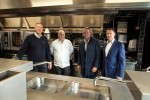
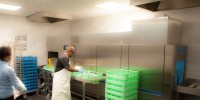
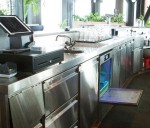
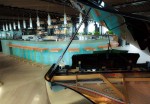
“Working with another consultant Director of Bert Muller, Edward Vinke, we were responsible to design the facilities and select the equipment for this project and to ensure that we could meet the requirements of LEED Platinum.” Bert Muller specified and installed equipment for the basement production kitchen, meeting room kitchens, ground floor restaurant, 21st floor bar and kitchen as well as bars on the first and ground floors. “To meet the requirements of LEED Platinum we had to be able to satisfy a process that included quantifying and detailing aspects of the equipment such as water, power and chemicals consumption but also where it came from and how many road miles has it travelled. Every piece of equipment was discussed, from the large flight dishwasher to the wooden service platters,” says van de Kaa.
“For example, we wanted proof of better environmental performance and chose brands which could deliver that.
“With regard to the large M-iQ flight dishwasher, Meiko was able to prove the machine’s water, energy and chemicals consumption.
“We have worked with Meiko in the Netherlands for 30 years. They find solutions and fulfill their promises. Their equipment is leading the world in terms of less water, less wasted heat, less noise, reduced maintenance and better installation.
“Meiko provides transparent, honest information and stands by its claims.”
The main dishwasher at The QO is an M-iQ M-iQ K-M54 V8 rack transport machine, which handles mostly kitchenware and crockery. The drying zone is incorporated within the 180-degree return bend. Outside of the main meal service periods, the machine also washes each of the hotel’s water bottles overnight in special wash crates. The bottles are filled via an in-house system and used in the restaurants and bars and two per guest room. Meiko M-iClean undercounter machines are installed in all of the bars to handle glassware.
GiO reverse osmosis water treatment is fitted remotely to these machines; a gap of up to three metres is possible, allowing the machine to fit neatly under the bar counter. Adjacent to the 21st floor kitchen area is a Meiko DV80.2 GiO dishwasher, with stunning views over Amsterdam for the operator! Executive Chef Alexander Brouwer is in charge of the daily management of the restaurants and bars. “We took great care to ensure the kitchen and dishwashing equipment provided the most sustainable package for our needs,” says Brouwer.
“Every piece of equipment, from the wooden serving platters to the dishwashers and kitchen range, was discussed and rated for its environmental performance, including the road miles it took to get here.
“Meiko’s main dishwasher will be in use almost 24 hours per day. The blue colour-coded parts on the main dishwasher itself help the staff identify which parts require regular manual cleaning…’what’s blue is for you!’
“The GiO reverse osmosis water treatment is essential for the glassware especially; it helps to provide the very best quality washing results and our glasses are spotless and sparkling straight out of the machine, no hand polishing needed.”
“Our experience of customers using M-iQ machines is that they have always been pleased with the results,” says Willem van de Kaa.
“The results from the M-iClean undercounter machines with GiO reverse osmosis is simply outstanding. And our customers are finding that they are using 50 per cent less than their previous Meiko machines in terms of energy, water and chemicals.
“If we need assistance and technical advice, especially for unusual situations, then we go to Meiko. Meiko fits our goals; they are reliable, provide good assistance and first-class technical support.
“Meiko Netherlands also provides specific support for its dealers such as Bert Muller. This includes dedicated technical training for our staff and improved customer service, all of which saves us time and money while providing a better service for our customers.”
DESIGN: QO Amsterdam was designed by Mulderblauw Architects, in collaboration with Paul de Ruiter Architects and consultancy and engineering firm Arup. The hotel rooms are designed by the Conran Design Group from London. TANK is responsible for the interior of the restaurant, the bar and the public areas.
LEED is a national certification system developed by the U.S. Green Building Council to encourage the construction of energy and resource-efficient buildings that are healthy to live in. LEED stands for Leadership in Energy and Environmental Design.
The Netherland government has moved to provide incentives to achieve these sustainable standards. Buildings certified under LEED v4 BD+C: New Construction in the Netherlands are eligible to receive two tax deductions, with LEED Platinum projects allowed to claim a 27 percent one-time deduction from up to half of the investment cost of the building in the year of investment.
BREEAM also has had a strong presence in the Netherlands and is incentivized by the government through tax subsidies since 2011.
Fagus silvatica i beuk Amsterdamse Bos 1981-2017
Every piece of equipment was discussed and rated for its environmental performance, including road miles.
This service platter is made from beech (Fagus sylvatica) from the Amsterdamse Bos. This tree was planted in 1981 and cleared in 2017.
The Amsterdamse Bos is an artificially constructed forest 20 minutes by bike from the Rijksmuseum and 3 times larger than Central Park in New York. Every year there are 6 million visitors and the Forest is always open.
PHOTO CAPTION
Willem van de Kaa, Director, Bert Muller
Alexander Brouwer, Executive Chef, The QO
Bart Jasperse, Managing Director, Meiko NL
Hans Nunnikhoven, Dealer Manager, Meiko NL


